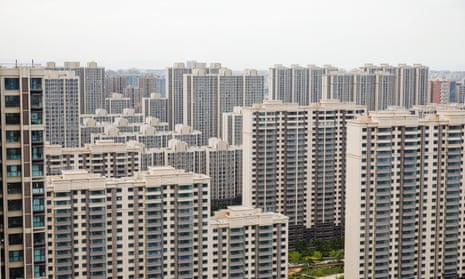Property sales in China could fall by one-third this year, spelling more trouble for the country’s giant housing sector as people lose faith in the market and pressure increases on struggling developers to complete presold apartments.
Amid reports that the government is preparing a bailout of the sector that could cost 300bn yuan ($44bn), experts at the rating agency S&P have concluded that the fall in sales will be twice as bad as they had originally forecast for this year.
“S&P Global Ratings now expects national property sales will fall 28%-33% this year,” the note said on Tuesday, “almost double the drop of our prior forecast.”
Last week’s news that disgruntled buyers of apartments at housing projects in more than 100 cities had banded together to withhold payments on unfinished homes has focused attention on the unfolding crisis.
The strike has ratcheted up the pressure on developers, who are already facing acute liquidity problems and who depend on customers paying upfront for homes off the plan to keep cash flowing through the business. The proceeds can be used to pay debts as well so the loss of this income will hit hard.
Some high-profile developers have already fallen into default, causing waves of panic in the global financial system – most notably Evergrande, the country’s second-biggest property firm which admitted last year that it could not pay part of its $300bn debt mountain.
Recent house sales data indicated that the steep falls in prices were evening out, but that was before news of the mortgage strike prompted a revision in forecasts. S&P thinks the contagion from weakening sales and loss of confidence could take down previously solid companies.
“This boycott on payments could easily spread to other developers, in our view,” S&P said.
Separate research by the agency puts the estimated value of the loans in question at almost 1tn yuan ($144bn) and could threaten financial stability if there was a sharp drop in prices, as now seems likely amid plunging sales. A slowing economy and rising unemployment are adding to the downward pressure on sales and prices.
“By stopping payments, China’s mortgagees are effectively pressuring banks and the government to help push developers deliver the residences people paid for,” said S&P Global Ratings credit analyst Yiran Zhong.
Local land sales are also affected as a result of the property downturn and the country’s draconian zero Covid policy. In the first half of the year, local land sales revenue declined sharply by 31% year-on-year. The decline may be narrowed in the second half of the year, but may still stay weak at -10%, due to subdued developers’ financing, according to UBS.
Beijing is clearly unnerved by recent developments. In the Communist party’s thinking, the stability of the property market affects social stability. This is particularly so in a year that President Xi Jinping is seeking an extraordinary third term as the leader at the party Congress in October.
The most visible sign yet that the authorities in Beijing are beginning to respond to the crisis came on Monday with reports that the government has set up a multibillion-yuan fund to help bail out the stricken sector.
Shares in property companies rallied after Reuters reported that the People’s Bank of China (PBOC) was engineering a fund of up to 300bn yuan ($44bn) to bail out the sector which accounts for at least 25% of output in the world’s second biggest economy. Chinese property is the biggest single asset class in the world and many investors are concerned that a sharp fall in valuations could have wider consequences for the global economy.
The fund would initially be set at 80bn yuan, according to a source quoted by Reuters. The state-owned China Construction Bank would contribute 50bn yuan, but the money would come from PBOC’s relending facility. If it was successful, other banks would follow suit with a target to raise up to 200-300bn yuan, the source added.
There is also nervousness in the sector as Evergrande prepares to reveal a long-awaited restructuring plan, promised by the end of July.
The company, which began as a property developer but diversified into resorts and even electric cars, was kneecapped by Beijing’s crackdown on “reckless lending” that began in 2020. It defaulted on offshore bond repayments in December and is now deemed in default of its entire $22.7bn worth of offshore debt, and the aftershocks have rippled through the Chinese economy ever since.
In mainland China, Evergrande has been extending its debt repayment obligations, though creditors are growing impatient. Its latest repayment extension proposal on a 4.5bn yuan ($666.7m) bond was voted down this month, while small suppliers, who are owed money, are also threatening to stop paying bank loans.
Evergrande also aimed to release a simple restructuring plan for its onshore debt as early as this week, financial information provider REDD reported on Friday.
Raymond Cheng, head of China and Hong Kong research at CGS-CIMB Securities, said Evergrande’s proposal should also outline what it will do with its unsold projects and existing land bank, which would have a direct impact on the broader property market.
“Investors will not look at Evergrande’s proposal solely from a company perspective, but also a macro perspective,” said Cheng.
